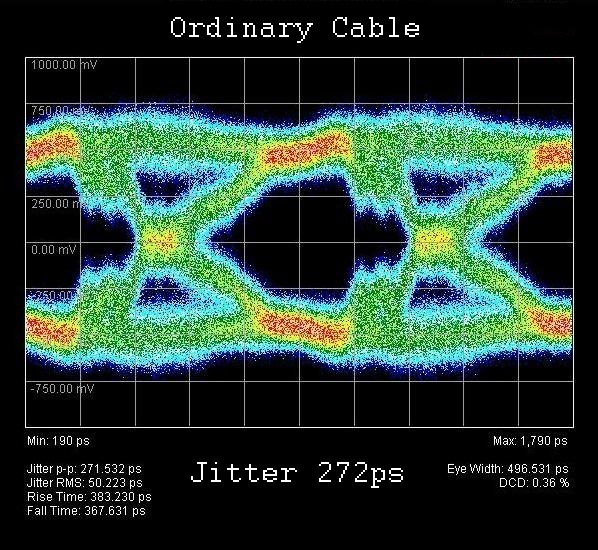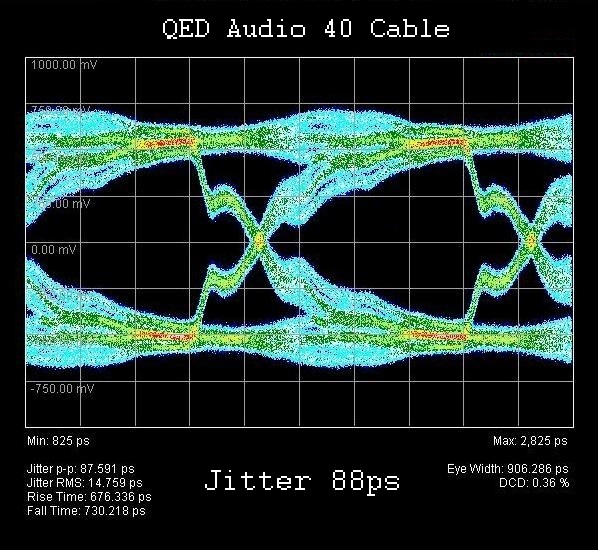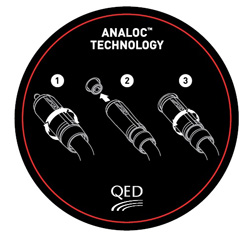Signature Audio 40 is an entirely new design concept from QED laboratories. The cordage is designed primarily for low capacitance as this has been identified by QED as a significant factor leading to a high fidelity experience and makes for a tight sound retaining the rhythm of the original piece. Add our Complementary Conductor TechnologyTM for high frequency detail and our Analoc TechnologyTM to maximise signal integrity and the result is what we feel to be the most innovative interconnect ever made by QED. Please see our ‘cables matter’ section below for more in-depth information on this ground breaking design.
AWARDS AND REVIEWS

HI-FI CHOICE RECOMMENDED, MARCH 2014
| There’s no denying QED’s leading role in the British cable market over the past 40 years – a whole nation of audiophiles grew up with QED 79-strand speaker cable in the eighties, likely between a NAD amp and a pair of KEF Codas! To commemorate its anniversary, it has a new range of interconnects. Between you and me dear reader, word is that they were developed after HFC’s epic 12-way interconnect Group Test that ran in issue 362 back in 2012; QED took a good listen to the winners and came back with this. The Signature 40 is a beautifully packaged product, and immaculately turned out with its translucent sheathing showing the braided electromagnetic shielding around it. QED’s beautiful Rhodium-plated Analoc plugs look like jewellery, and are said to provide a high-purity copper connection without the use of bulky brass plug bodies. They’re soldered to silver-plated 99.999% oxygen-free copper conductors in a Teflon dielectric, in an asymmetric twisted pair configuration and a Zn/ Mn ferrite jacket is used. Finally the whole cable is cryogenically treated. | DRESSED TO IMPRESSHere’s a genuinely impressive sounding audio interconnect. Although not completely translucent, the new Signature is open and detailed like few others at the price, with a light, spry sort of sound that captures the energy of the music in its full glory. Tonally, it’s very close to neutral, but comes across as just a little ‘well lit’ in absolute terms, pepping up otherwise lacklustre recordings or systems by a fraction. It has strong and taut bass,happily lacking in overhang or smear, and a crisp and incisive midband that lets the elements in the mix hang in their respective positions in space with ease. It doesn’t crowd out things, offering a nice spacious soundstage where there’s room for the music to breathe. Treble is sweet and airy, too. Overall then, this new cable is an excellent performer at the price, right across the board.
|
FEATURES AND BENEFITS
COMPLEMENTARY CONDUCTOR TECHNOLOGYTMThis innovation utilises two conductors of different diameters to carry the same audio signal. This has the effect of providing an alternative path for high frequency audio components which might otherwise become time smeared in a single audio pathway. TEFLON DIELECTRICThis material with its low dielectric constant has been used to cut down on the amount of audio signal energy lost due to cable capacitance. CRYOGENIC TREATMENTIt is understood that cryogenic treatment results in the elimination of dislocations and fractures in the material’s micro-structure. Trumpets and other brass instruments have been found to produce a better tone after Deep Cryogenic Treatment (below −190 °C, −310 °F) and it also extends their working life. Our extensive listening tests have shown that the cryogenically treated cable is preferred over the same cable without the treatment. | ANALOCTM LOCKING RCA PLUGSThe new QED Analoc™ plug is a low eddy current design featuring small high purity copper conductors in place of the usual large volume brass body found in ordinary high quality plugs. This cuts down or eliminates the tendency for the changing magnetic field in the conductor to induce eddy currents which can affect the micro timing of the audio signal. Rhodium plating has the advantage for use as a plating material due to its superior hardness. SPECIFICATIONSSilver Plated 99.999% Oxygen Free Copper(SPOFC) conductors with Teflon™ dielectric SPOFC shield giving 100% electromagnetic screening Zn/Mn ferrite Jacket Rhodium plated QED ‘Analoc™’ RCA plugs Capacitance: 63pF/m Inductance: 0.37uH/m Loop resistance: 0.072 Ω/m Dissipation Factor: 0.0011 QED Lifetime Guarantee |
| Reference and Signature Audio 40 analogue cables use ‘Analoc™’ plugs with a built-in locking feature so that as the barrel is screwed up tight, the clamping force is increased making for a super noise free and secure connection. | To correctly fit ‘Analoc™’ plugs, the outer locking cylinder of the plug must be screwed forward, to loosen the gripping ‘blades’, whilst the plug is pushed into place on the socket. The locking cylinder should then be screwed back in order to lock the plug onto the socket. Needless to say, users must always remember to do this when connecting/disconnecting the cables. |
WHAT THIS CABLE IS USED FOR
CONNECT YOUR:CD player DAC Turntable DVD player Tuner Audio Component | TO YOUR:Amplifier Receiver |
CABLES MATTER
| There are three cables in the Audio 40 range representing the long established Performance, Reference and Signature designations which have always corresponded to the “good, better, best” principle of QED product hierarchy.* However the whole range has been developed using a strict top down approach which means that all three cables share an almost identical construction and geometry with the Signature cable representing the ideal ‘cost no object’ original state of the design and the Performance cable its cost engineered alternative. The Reference cable represents the perfect balance of performance against the law of diminishing returns omitting only the most expensive components. *Performance Audio 40 to be launched 2015. The cordage is designed primarily for low capacitance as this has been identified by QED as the major factor which leads to a hi-fidelity experience and makes for a tight sound which retains the rhythm of the original piece. Further unique steps have also been taken to eliminate minute timing errors in the cable. Our new complementary conductor geometry is used throughout the range and utilises two conductors of different diameters to carry the same audio signal. This has the effect of providing an alternative path for high frequency audio components which might otherwise become time smeared in a single audio pathway. Another innovation added to the entire range is the specially impregnated PVC jacket containing 10% Zn/Mn ferrite material. This absorbs very high frequency noise signals and audio signal components which are thought to have an adverse affect on the micro-timing of the audio signal. Low dielectric constant materials such as foamed polyethylene or teflon have been used throughout the range to cut down on the amount of audio signal energy lost due to cable capacitance and all of these measures have been applied under the consultation of leading industry experts. We have been able to measure the affects of these improvements using our high frequency cable test suite. Additionally the new locking plug does nothing to spoil the low jitter, low noise signal provided by the cordage. The new QED Analoc™ plug is a low eddy current design featuring small high purity copper conductors in place of the usual large volume brass body found in ordinary high quality plugs. This cuts down or eliminates the tendency for the changing magnetic field in the conductor to induce eddy currents which can affect the micro-timing of the audio signal. Coupled with its hollow central pin, which is designed to combat the skin effect in the same way as our X-Tube speaker cables, the new QED Analoc ™ plug maintains the fidelity of the audio signal from start to finish. Traditionally high quality RCA phono plugs (designed in the 1940s and still used today for domestic unbalanced audio connections) have been machined from solid brass. Brass is a reasonably inexpensive material and can be easily worked so it lends itself to use in bespoke designs which attempt to improve | upon more basic implementations of the original RCA plug. Unfortunately there are a few problems with the use of bulk brass, the first being its low conductivity compared to pure copper. Pure copper plugs would be prohibitively expensive and so are not used but if the high purity copper conductors were confined to just the pin section and the small contact areas required for the return ring then this would be economically viable. QED’s new Analoc™ plugs take advantage of this idea and provide a high purity copper connection without the use of bulky brass plug bodies. The pin section is made from a hollow tube of high purity copper and the ground return is reduced to just two of the normal six leaves. This has the dual effect of providing a low resistance path for the tiny signal currents flowing in line level unbalanced connections and cuts out the possibility of eddy currents forming in the large volume of the plug body which would otherwise form part of the return path for the signal. Eddy currents are swirling circular currents which build up in any conductor where there is a variable magnetic field acting on it such as when an a.c. signal is applied. Eddy currents flowing in a conductor of a given resistivity necessarily dissipate energy and this energy loss is proportional to the square of the diameter of the conductor – so the smaller this can be kept, the less the effect of eddy currents on the delicate audio signal. Add to this that due to self inductance eddy currents can persist for a short time after the field is removed and always create a field that opposes that which creates them, it can be seen that eliminating this phenomenon can lead to improved transmission of the audio signal – especially in the area of minute timing effects. Eddy currents give rise to the skin effect wherein the current increasingly flows towards the outside of the conductor as frequency increases. By removing the central portion of the copper pin section we have reduced eddy currents here also and thus combated the skin effect and reduced self inductance in a similar way to that employed in our X-Tube™ speaker cables. Because the contact area of the outer ground ring has been reduced it is necessary to provide a very firm connection indeed and so all Analoc™ plugs have a locking feature built in so that as the barrel is screwed up tight, the clamping force is increased making for a super noise free and secure connection for life. The high purity copper conductors featured in the Analoc range come with gold plating at Reference level and rhodium plating for the Signature plugs. This plating is there to maintain low contact resistance throughout the life of the product due to the stability and low reactivity of these metals. Although copper is the second best electrical conductor (behind silver) it does react with oxygen and can tarnish over time increasing the contact resistance and therefore increasing distortion of the original signal. Rhodium has the advantage for use as a plating material due to its superior hardness. QED Analoc comes as standard on the Audio 40 interconnect range and can be purchased separately to be included in custom cable projects. |
HIGH FREQUENCY DATA STREAMS
 The two diagrams above show the difference measured in a high frequency data stream applied to an ordinary cable without the improvements (left) and with the improvements in the QED cable (right) |  The ability to accurately transmit high frequency impulses means that within the audio band timing and dynamics should be improved. |
OVERALL PERFORMANCE
ANALOC™ TECHNOLOGYQED ‘Analoc™ RCA plug which features high purity copper signal and ground connections in an insulated low eddy current brass body. The hollow central pin eliminates skin effect in the signal connection and the locking barrel design clamps the dual tombstone ground connection firmly to the RCA sockets |
COMPLEMENTARY CONDUCTOR TECHNOLOGYComplementary conductor geometry utilises two conductors of different diameters to carry the same audio signal. This has the effect of providing an alternative path for high frequency audio components which might otherwise become time smeared in a single audio pathway. |







Değerlendirmeler
There are no reviews yet